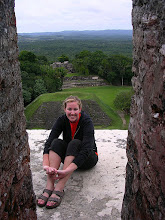
My friend Nancy greets me every day
These greetings are just one of the things I miss about Ghana. I also miss the food - banku, a starch base made out of fermented maize, and groundnut (peanut) soup is my favourite. I miss hanging out with my two young host brothers, Charles and Emmanuel, playing Owari or listening to music. I miss riding my bicycle around town and calling out to all of the people I know. I miss taking the time to enjoy every day, reveling in the relationships I have with the people around me. I miss traveling around the Upper West Region, visiting schools in some of the poorest places in Ghana and still being inspired by the dreams of the students there. And I miss my friends: Natalia, KK, Kobe, Nancy and many others.

My good friend Kobe
Now I am back in Canada, back at school, and back to my busy life. But Ghana hasn’t left me yet. It is still there, inside me, screaming to get out.
Ghana is one of the richer African nations, yet it still houses so much poverty. There are many people there who need our support as Canadians. And I, as someone who has been fortunate enough to travel to Ghana, am in a unique position. I have a choice. Will I keep my experiences bottled up inside me, enjoying the memories but convinced that “no one will understand”? Or will I share them with everyone I talk to, reminding Canadians that we have the power to make a difference all the way around the world?
Ghana is one of the richer African nations, yet it still houses so much poverty. There are many people there who need our support as Canadians. And I, as someone who has been fortunate enough to travel to Ghana, am in a unique position. I have a choice. Will I keep my experiences bottled up inside me, enjoying the memories but convinced that “no one will understand”? Or will I share them with everyone I talk to, reminding Canadians that we have the power to make a difference all the way around the world?

A girl carries a basin of water from a nearby borehole to her home
I choose the latter.
So I am here to remind you that you have the power to affect change. There are many things we can do as Canadians, right here at home, to make the lives of those living in poverty overseas a little more bearable. Here are a few things you can do:
1) Buy Fair Trade products, such as coffee, tea, chocolate, sugar, bananas and other fruit, sports equipment, clothing, and lots more;
2) Donate to a charity that can SHOW you the impact it’s having overseas;
3) Write a letter to your MP to tell them you care about Foreign Aid;
(on a related note, the Canadian government recently rolled out a plan to UNTIE AID!!! This is super-exciting news for those of us who have been campaigning on this issue for years. Read more here: http://www.canada.com/ottawacitizen/news/story.html?id=f08c2405-d12b-4e11-9516-bd7faa004aca and then send a letter to your MP congratulating them on the new plan!)
4) VOTE in the upcoming federal election, and keep international issues in mind. Challenge your candidates to answer tough questions about their foreign policies and make them stick to it;
5) Volunteer for a social justice organisation;
6) Learn about another culture - see a foreign film, try a new restaurant, or talk to someone from a different country;
7) Try living off a dollar a day, just to see what it’s like (and yes, that dollar a day has been adjusted for Purchasing Power Parity).

This girl's shirt was shipped from Canada to Ghana - a common fate for our used clothing
Most of all, affecting change overseas requires a change in ourselves. We as Canadians need to change our attitudes and behaviour to better reflect our values. Canada has lost its reputation as a peacekeeping nation, but that doesn’t mean Canadians have lost their compassion. It’s time to stop being complacent and start demanding that Canada once again becomes a global leader when it comes to eradicating world poverty. But it’s up to you!











